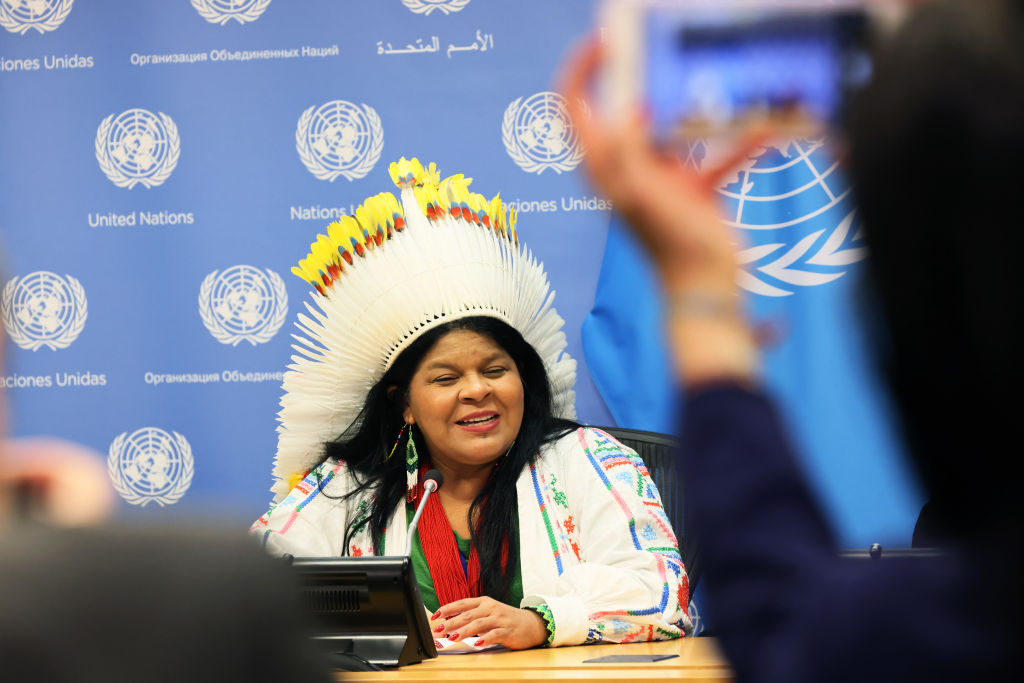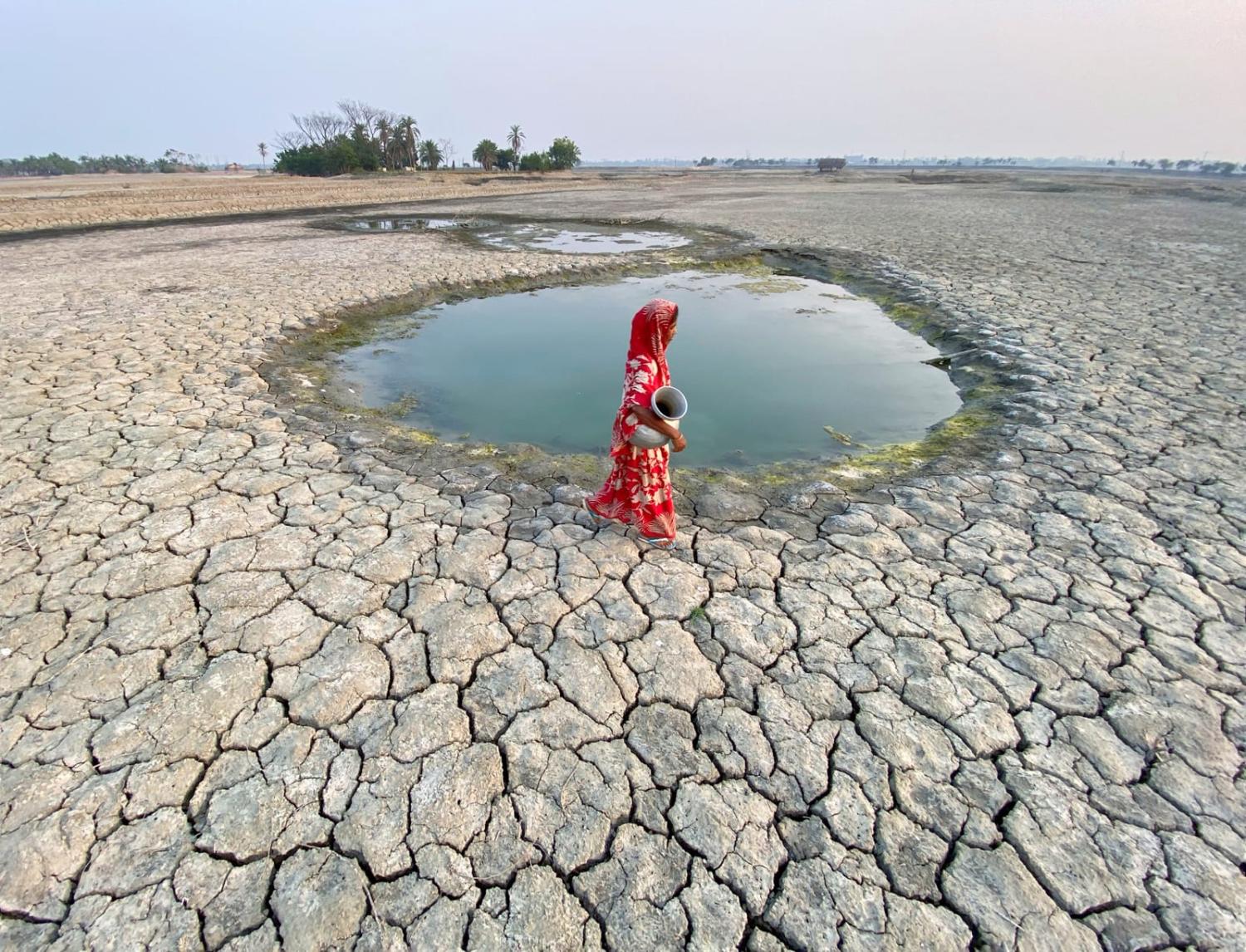On a bright afternoon in Midtown Manhattan last month, activists, experts, and officials gathered to celebrate the launch of a new movement to support the climate leadership of Indigenous women. While relegated to the sidelines of the 2023 United Nations General Assembly session underway at UN headquarters, Global South activists coming from Latin America to the Pacific Islands made it clear their voices would be central to any climate solution.
The launch was spearheaded by Sônia Guajajara, Brazil’s first-ever Minister for Indigenous Peoples, who called for women leaders worldwide to join the movement ahead of the UN climate summit that will take place in the Brazilian city of Belém, known as the gateway to the Amazon, in 2025. “We’re going to take over international spaces,” said Leila Salazar-López, Executive Director of Amazon Watch.
Amid the furore of the UN General Assembly and Climate Week, a groundswell of Global South activism has argued the link between the climate crisis and human rights, particularly the rights of women, Indigenous peoples, and other marginalised communities.
Mainstream climate mitigation efforts have only recently acknowledged the human rights impact of global warming. In 2022, the UN recognised that all people have the right to a healthy environment, and appointed its first advocate for “the Protection of Human Rights in the context of Climate Change”. However, for Global South activists on the frontlines of the climate crisis, this recognition came as no surprise: climate-induced harms have long been their reality.
Originally a local organiser, mother, and teacher, Guajajara became a leading voice in the decades-long protests against Brazil’s Belo Monte mega-dam. Indigenous activists were the first to question the development. Amazon Watch's Salazar-López asked “Who is this dam for? Who is this energy for…when local communities are being displaced?”
After fighting the dam’s construction, Guajajara won a 2022 congressional election, becoming a global voice for Indigenous rights and environmental protection. In a statement provided after the event, Guajajara argued that climate finance mechanisms – such as the Amazon Fund – must be implemented with direct Indigenous participation and complemented by efforts to combat violence against women and Indigenous peoples.

While the threat climate change poses to human rights is increasingly recognised, some critics claim that the idea of “human rights” only reinforces inequality between the Global North and South. They argue that human rights law – and its associated international treaties and institutions, including the UN and the International Court of Justice (ICJ) – is a legacy of colonial rule. Historically, this colonial legacy was seen in the narrow human rights framework, championed by Western governments, which sidelined questions of economic justice, redistribution, and reparations: the same structural ideas that are integral to the pursuit of climate justice.
However, for a group of law students from the University of the South Pacific, the climate crisis represents an opportunity to reimagine – not reject – the idea of human rights. When they founded Pacific Islands Students Fighting Climate Change (PISFCC) in 2019, they could never have predicted that their local activism would lead them to the forefront of global efforts to reform human rights law for the climate crisis.
“It’s been quite a journey,” said Vishal Prasad, from Fiji, the organisation’s campaign director, “from the Pacific Islands to the world’s highest court”. Holding their own event on the sidelines of UNGA, the youth activists had reason to celebrate, having been instrumental in the successful campaign for the ICJ to issue a legal opinion on states’ obligations regarding climate change. The court must specifically address what states owe those for whom the climate crisis is an existential risk: future generations and small island developing states. This is a world first for climate change litigation. But, for these activists, its real significance lies in the Pacific’s struggle for climate justice.
The court’s opinion is “a way to channel our frustrations and anger into something tangible,” said Prasad. Although not legally binding, the ICJ opinion will provide activists with a tool to lobby states for meaningful climate action. A progressive opinion would empower them to confront climate risks that have fallen on “deaf ears” in the Global North, including loss and damage, North-South reparations, and climate migration. “This is a way for the Pacific to fight for justice,” said Prasad, and for the Global South to finally occupy the “driver’s seat” of international law. This more just, redistributive approach to climate change and human rights has been echoed by some academics and policymakers.
However, as an “era of global boiling” dawns, other climate activists fear the law’s failure to secure climate justice. “We need to convey the urgency of the crisis,” said Martin Gioannetti, a Climate Defiance activist who dropped out of engineering school to “fight for [his] future full-time”. During UNGA, he and other activists disrupted keynote addresses by Ali Zaidi, President Biden’s chief climate aide and former legal representative for fossil fuel companies, and chased Tommy Beaudreau, signatory of a major oil drilling project in Alaska, through the streets of Manhattan. “Law as a part of politics is the way to seek change,” said Gioannetti, “but [it] can also be used as a tool to cause harm”.
Despite the long road ahead, Global South activists remain committed to the role of human rights in tackling the climate crisis. At the launch presided over by Guajajara, it was clear who led the way. As Guajajara said in her statement, “At a time when the whole world is discussing climate change … we are here to say that without the demarcation of Indigenous lands, without the protection of our biomes, there will be no solution to this climate crisis.”

